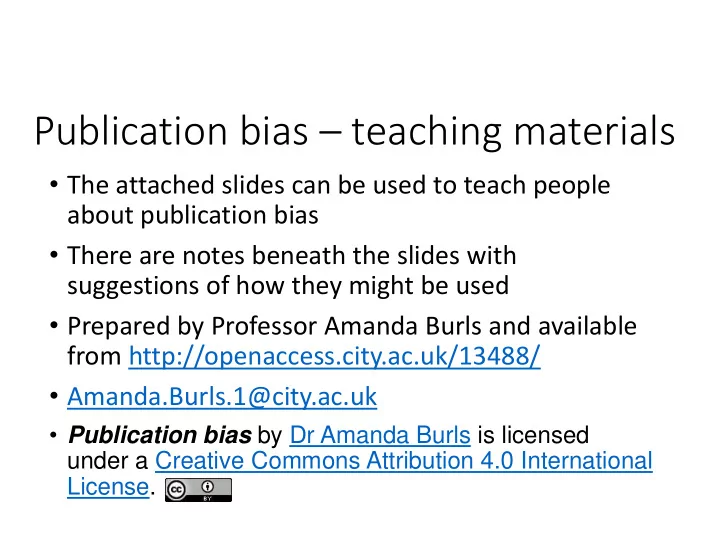

Publication bias – teaching materials • The attached slides can be used to teach people about publication bias • There are notes beneath the slides with suggestions of how they might be used • Prepared by Professor Amanda Burls and available from http://openaccess.city.ac.uk/13488/ • Amanda.Burls.1@city.ac.uk • Publication bias by Dr Amanda Burls is licensed under a Creative Commons Attribution 4.0 International License.
Who’s heard of friendly bacteria?
You are seeing a patient and she asks… “Should I buy Activia™ to help with my tummy pain and improve my constipation?” You have 1 min inute to dis iscuss wit ith your neighbour what you would 0:18 0:19 0:22 0:20 0:21 0:28 0:23 0:24 0:25 0:26 0:27 0:16 0:17 0:09 0:15 0:14 0:13 0:12 0:10 0:30 0:08 0:07 0:06 0:05 0:04 0:03 0:02 0:01 0:29 0:36 0:31 0:32 1:00 0:59 0:58 0:57 0:56 0:55 0:54 0:53 0:52 0:51 0:50 0:49 0:48 0:47 0:39 0:33 0:34 0:35 0:37 0:38 0:40 0:46 0:41 0:42 0:43 0:44 0:45 0:11 End tell her?
Which of the following is closest to your answer? 1. Try it - it can help some people 39% 2. You need to ask a doctor a question like that 3. Yes, but any live yoghurt will do 4. No, there’s no evidence it helps 21% 5. I don’t know 18% 6. I don’t know, but it can’t do any harm 13% 7. I don’t know, but I’ll look up the evidence and tell you next week 5% 3% 0% 1. 2. 3. 4. 5. 6. 7.
What is the evidence? • What sort of study design would be best for answering this question?
Randomised Control Trial (RCT) of live yoghurt for Inflammatory Bowel Syndrome (IBS) • P: Adults with IBS • I: Activia (2 pots per day) • C: Identical yoghurt with no live bacteria (2 pots per day) • O: Adequate symptom relief • T: 12 weeks • Funded by Danone • Undertaken by independent researchers at the University of Birmingham
RCT comparing live yoghurt with ordinary yoghurt IBS • The trial ended in 2005 • What do you think the results showed?
Results for primary outcome 0:44 0:32 0:33 0:34 0:35 0:36 0:37 0:38 0:39 0:40 0:41 0:42 0:43 0:45 0:30 0:46 0:47 0:48 0:49 0:50 0:51 0:52 0:53 0:54 0:55 0:56 0:57 0:31 0:29 0:59 0:13 0:01 0:02 0:03 0:04 0:05 0:06 0:07 0:08 0:09 0:10 0:11 0:12 0:14 0:28 0:15 0:16 0:17 0:18 0:19 0:20 0:21 0:22 0:23 0:24 0:25 0:26 0:27 0:58 1:00 2:00 1:45 1:33 1:34 1:35 1:36 1:37 1:38 1:39 1:40 1:41 1:42 1:43 1:44 1:46 1:31 1:47 1:48 1:49 1:50 1:51 1:52 1:53 1:54 1:55 1:56 1:57 1:58 1:59 1:32 1:30 1:01 1:14 1:02 1:03 1:04 1:05 1:06 1:07 1:08 1:09 1:10 1:11 1:12 1:13 1:15 1:29 1:16 1:17 1:18 1:19 1:20 1:21 1:22 1:23 1:24 1:25 1:26 1:27 1:28 End
Results for primary outcome
One participant in trial finally wrote to the investigator when these results had not been published five years later. This was the reply…
Sent: 19 January 2010 15:45 To: Dr Amanda Burls Subject: RE: Yoghurt trial Dear Amanda, The trial is not yet in press - this is in part due to the much longer than anticipated further analysis of the data at the funders request. In summary this was a negative trial - although both groups demonstrated benefit, those in the active product group did not show greater benefit and at times the difference actually favoured the control product….
Publication bias – the tendency not to publish negative findings
The trial was finally published eight years later (after pressure to do so)...
However, publication bias is • Not only about not publishing • Can also be about reporting outcomes that were positive but not mentioning those that were not (even when they were the primary outcome) • Putting more positive results in the Abstract of the paper • Distorting the Conclusions
Let’s compare your conclusions to those in the paper
Let’s compare our implications for practice with those of the authors
A biased conclusion - great for Danone! • Activia was worse than the control yoghurt • But, let’s recommend fermented dairy products anyway! • To back up such a recommendation randomized control trials are needed showing that fermented dairy products help patients with IBS compared to not having them. • Otherwise we can’t exclude bias or regression to the mean (that people get better anyway, without treatment!)
Further slides for later classes on publication bias
Looking for bias in systematic reviews
A funnel plot Size of study Estimate of truth
Funnel plots… • …are scatter plots of treatment effect estimated from individual studies (x axis) against a measure of each study’s sample size (y axis). • The precision of the estimates of the treatment effect increases as sample size Size of study increases. • Effect estimates from small studies scatter more widely at the bottom of the graph, with the spread narrowing among larger studies. Treatment effect • In the absence of bias the plot should resemble a symmetrical inverted funnel.
A funnel plot Size of study
A funnel plot Size of study
A funnel plot Size of study
Publication bias distorts results
A funnel plot Size of study Favours treatment Favours control
A funnel plot Size of study Favours treatment Favours control
Sources of asymmetry • Publication bias • Poor methodological quality of smaller studies • True heterogeneity i.e. size of effect differs according to study size • for example, due to differences in the intensity of interventions or differences in underlying risk between studies of different sizes • Chance
Recommend
More recommend